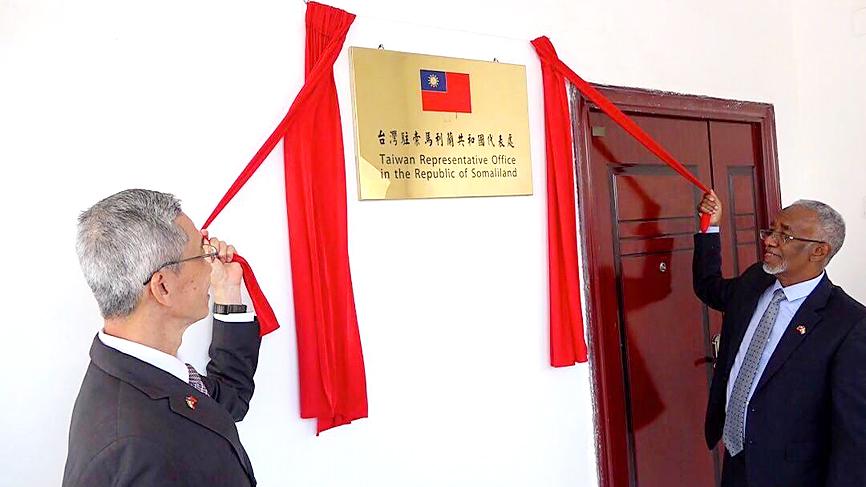Somaliland would officially open a representative office in Taipei early next month, the self-declared east African state’s first representative to Taiwan, Mohamed Omar Hagi Mohamoud, said yesterday.
Preparations are still under way to set up the representative office, but it is expected to start operations on Sept. 9, Mohamoud said.
Working with the representative would be four employees, two who arrived from Somaliland with Mohamoud and two Taiwanese, who have yet to be recruited, he added.

Photo: EPA-EFE
The representative revealed the plan on the sidelines of a seminar held by the Taipei-based Chinese International Economic Cooperation Association on allowing Africa-based Taiwanese businesspeople and African students studying in Taiwan to share their views on exploring trade opportunities on the continent.
It was the first event that Mohamoud has attended since he completed a 14-day quarantine after arriving in Taiwan on Aug. 7.
Mohamoud described relations between Somaliland and Taiwan as “formal,” saying that the proof is February’s agreement signed by their foreign ministers that each would establish a representative office in the other’s country.
High-ranking officials from the two nations participated in a ceremony on Monday last week to mark Taiwan’s opening of its representative office in the Somaliland capital, Hargeisa.
The agreement, designed to pave the way toward greater cooperation, has attracted the ire of China, which considers Taiwan as its territory, and Somalia, which has a similar view of Somaliland.
However, despite Chinese influence and pressure, Mohamoud said that Somaliland’s relationship with Taiwan would remain unaffected.
Somaliland is an independent, sovereign country, Mohamoud said, adding that other countries cannot dictate “with whom we are going to develop relations.”
Somaliland declared independence from Somalia in 1991 after a civil war.
Somaliland has set up 22 representative offices, including in Belgium, Canada, France, Switzerland and the US, Minister of Foreign Affairs Joseph Wu (吳釗燮) said.

NATIONAL SECURITY THREAT: An official said that Guan Guan’s comments had gone beyond the threshold of free speech, as she advocated for the destruction of the ROC China-born media influencer Guan Guan’s (關關) residency permit has been revoked for repeatedly posting pro-China content that threatens national security, the National Immigration Agency said yesterday. Guan Guan has said many controversial things in her videos posted to Douyin (抖音), including “the red flag will soon be painted all over Taiwan” and “Taiwan is an inseparable part of China,” while expressing hope for expedited “reunification.” The agency received multiple reports alleging that Guan Guan had advocated for armed reunification last year. After investigating, the agency last month issued a notice requiring her to appear and account for her actions. Guan Guan appeared as required,

A strong cold air mass is expected to arrive tonight, bringing a change in weather and a drop in temperature, the Central Weather Administration (CWA) said. The coldest time would be early on Thursday morning, with temperatures in some areas dipping as low as 8°C, it said. Daytime highs yesterday were 22°C to 24°C in northern and eastern Taiwan, and about 25°C to 28°C in the central and southern regions, it said. However, nighttime lows would dip to about 15°C to 16°C in central and northern Taiwan as well as the northeast, and 17°C to 19°C elsewhere, it said. Tropical Storm Nokaen, currently

‘NATO-PLUS’: ‘Our strategic partners in the Indo-Pacific are facing increasing aggression by the Chinese Communist Party,’ US Representative Rob Wittman said The US House of Representatives on Monday released its version of the Consolidated Appropriations Act, which includes US$1.15 billion to support security cooperation with Taiwan. The omnibus act, covering US$1.2 trillion of spending, allocates US$1 billion for the Taiwan Security Cooperation Initiative, as well as US$150 million for the replacement of defense articles and reimbursement of defense services provided to Taiwan. The fund allocations were based on the US National Defense Authorization Act for fiscal 2026 that was passed by the US Congress last month and authorized up to US$1 billion to the US Defense Security Cooperation Agency in support of the

PAPERS, PLEASE: The gang exploited the high value of the passports, selling them at inflated prices to Chinese buyers, who would treat them as ‘invisibility cloaks’ The Yilan District Court has handed four members of a syndicate prison terms ranging from one year and two months to two years and two months for their involvement in a scheme to purchase Taiwanese passports and resell them abroad at a massive markup. A Chinese human smuggling syndicate purchased Taiwanese passports through local criminal networks, exploiting the passports’ visa-free travel privileges to turn a profit of more than 20 times the original price, the court said. Such criminal organizations enable people to impersonate Taiwanese when entering and exiting Taiwan and other countries, undermining social order and the credibility of the nation’s